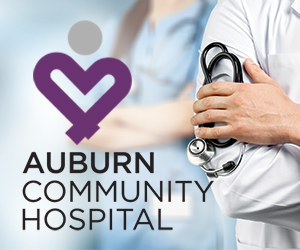By Cari Wade Gervin
Thursday, April 22, 2021
Overarching expertise and training have made the hospital’s surgical offerings the most advanced in the region.
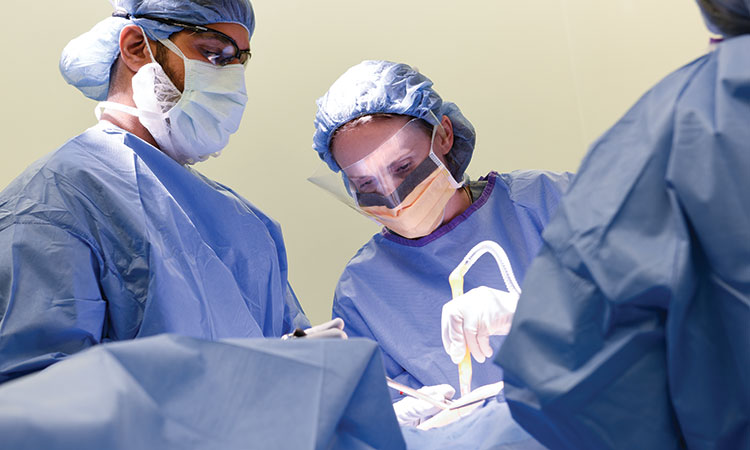
There are seven clinical departments that offer surgery at Upstate University Hospital. Collectively, the hospital offers more surgeons, robotic instrumentation and specialty procedures than any other facility in Central New York, with the Department of Surgery providing the largest component.
“We’ve grown in almost every area,” says Robert Cooney, MD, a bariatric and trauma surgical specialist and Professor and Chair of Surgery at SUNY Upstate Medical University for 12 years. “When I started here, the department had a strong foundation, but needed to develop surgical expertise in several areas. Now we are committed as an institution to providing the most advanced care in the region.”
“Every one of our surgeons is fellowship-trained,” Dr. Cooney says of his department, which has 12 surgical divisions with many surgeons also cross-trained in more than one specialty. “This allows us to bring the most leading-edge care to all our patients.”
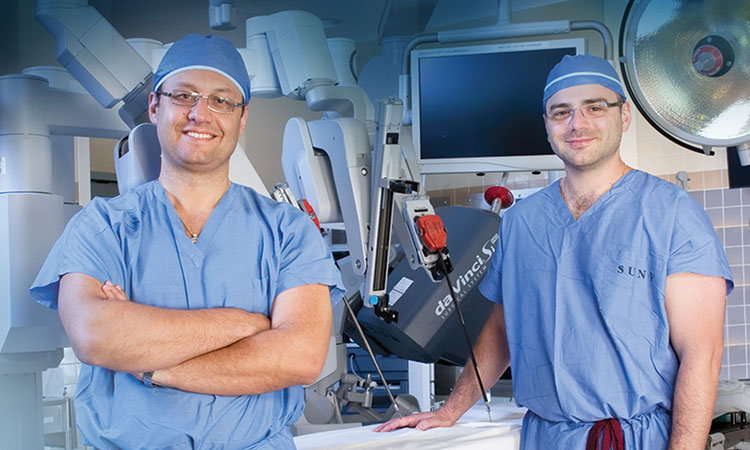
A Breadth of Surgical Specialties for Adults and Children
Of the departments offering surgery, ENT, Neurosurgery, Ophthalmology, Orthopedics, Urology, along with Surgery itself, also offer procedures for children.
“When I started, we had one pediatric surgeon in the department who was close to retirement,” Dr. Cooney says. “This year we just hired our fifth pediatric surgeon, and now we provide 24/7 pediatric surgical care for the entire region. We have built out the program in Golisano Children’s Hospital and developed an entire infrastructure for pediatric surgery.
“Our goal continues to be to meet the needs of the people in Central New York, so they don’t have to travel to Boston or New York City or somewhere else for care,” Dr. Cooney says.
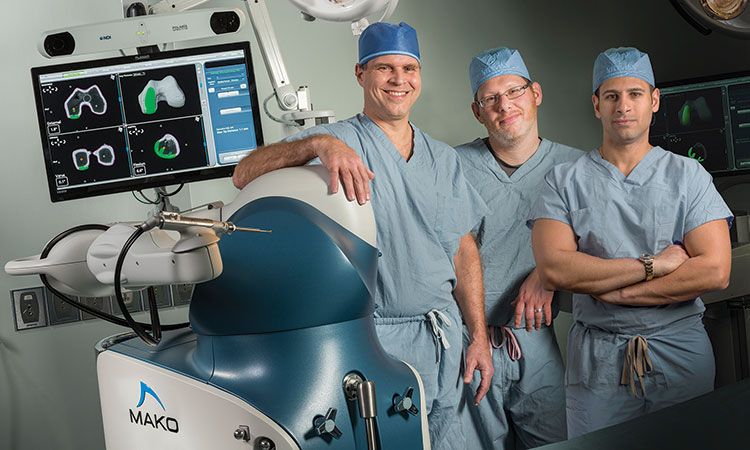
Expanding Cancer Care
The past decade has seen the expansion of cancer surgical specialties at Upstate.
The surgeons who treat cancer see patients through the Upstate Cancer Center, a newer facility which provides disease-specific, multidisciplinary care to patients with different types of cancer.
Thomas VanderMeer, MD, FACS, Professor of Surgery at Upstate Medical University and Division Chief of Surgical Oncology, Hepatobiliary and Pancreatic Surgery, says he joined the Upstate University Hospital team two years ago so he could practice in its state-of-the-art Cancer Center.
“The surgeons work with radiation oncologists, medical oncologists and a wonderful group of allied health professionals,” Dr. VanderMeer says. “Surgeons and physicians tend to lead these teams, but the contributions of our diverse team of nursing and specialists in integrative medicine, psychology, palliative care, nutrition, cancer genetics and social work are important to providing the comprehensive care that cancer patients need. This integration of resources and people dedicated to caring for patients with cancer is really unrivaled in the region.”
The Cancer Center’s multidisciplinary approach is key to ensuring patients receive the best care, with dedicated teams addressing specific cancer types and reviewing cases together.
“In terms of treatment, most people are going to need some combination of surgery, chemotherapy and radiation,” Dr. VanderMeer says. “Figuring out how to incorporate the best available treatments into our pathways of care, especially as a patient’s status changes, is something that requires constant attention from our team.”
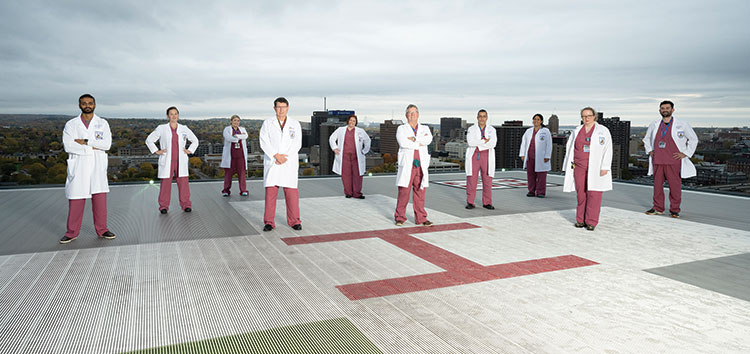
Improved Outcomes for Organ Transplants
Kidney transplantation also has been an area of growth. In the past five years, the transplant program has increased positive outcomes for patients, with the 1,000th deceased donor transplant performed in late 2020 and more than 400 living donor kidney transplants to date.
The average time it takes to receive a kidney transplant in New York State is five years, but Upstate University Hospital has cut that time in half. The team has also launched a pancreas transplant program, and the hospital has the only approved pediatric kidney transplant program in Central New York.
Transplant Division Chief Reza Saidi, MD, FACS, FICS, says the program has developed a reputation for getting people timely transplants.
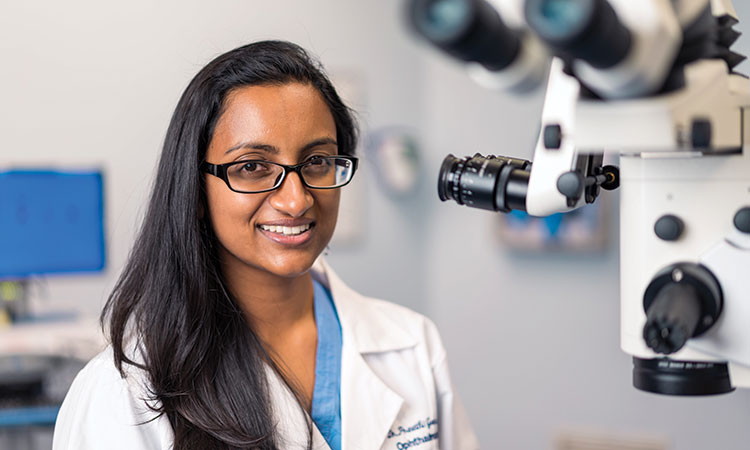
Peak Surgical Quality
In December 2020, Upstate announced that the American College of Surgeons National Surgical Quality Improvement Program (NSQIP) named Upstate Community Hospital as one of just 89 facilities nationwide for meritorious outcomes for surgical care. Among its many awards, Upstate also has earned DNV accreditation as a Center of Excellence for Hip and Knee and as Blue Distinction Center, which also was achieved by its spine program. The pancreatic surgery program is recognized by the National Pancreas Foundation as a National Center of Excellence, and the breast cancer program is accredited nationally. In 2018, NSQIP recognized Upstate University Hospital as a high performer regarding care of high-risk surgical patients.
“The Surgical Quality Program focuses on monitoring and improving the quality of surgical care,” Dr. VanderMeer says. “We believe that by measuring what we do and being intentional about the way we provide care, we can make sure that our patients’ outcomes are always improving.”
Upstate defines outcomes not just on typical things, like complications or timings.
“We also prioritize patient satisfaction and quality of life so that our clinical care addresses all the needs of our patients and their families,” Dr. VanderMeer adds.
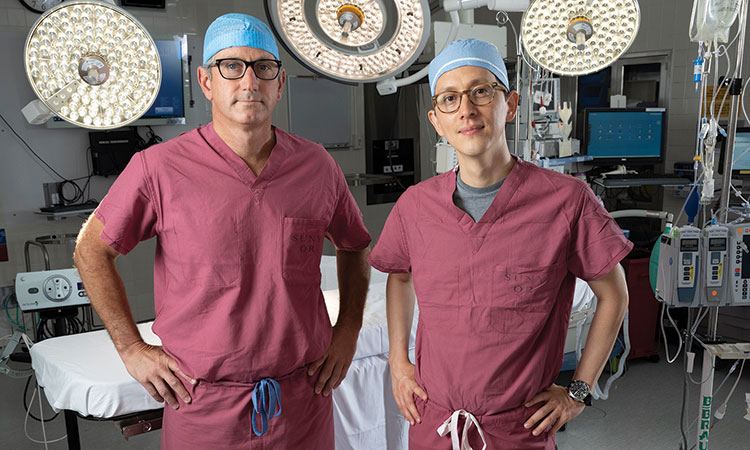
Coordinated Care for Comorbidities
The size of the Upstate University Hospital system makes it easy to coordinate comprehensive care for patients, no matter what health struggles they may be facing.
It is not uncommon for more than one surgical team to be treating a patient and the communication infrastructure streamlines bringing in any necessary experts. The surgeons also take care to communicate with primary care providers, as the hospital may be treating a patient for one condition or several.
Upstate Introduces TT Maze Procedure: An example of new offerings
There’s good news for patients with atrial fibrillation (AFib). The Upstate Heart Institute is now offering advanced minimally invasive surgery to eliminate chronic atrial fibrillation.
The total thoracoscopic maze (TT Maze) procedure can be used for many patients in place of the traditional open chest maze procedure to correct severe abnormal heart rhythms.
“TT Maze is a great treatment option because it provides a very high success rate without large incisions on the chest,” says Stephen Waterford, MD, Assistant Professor of Surgery. “Another benefit is that a heart-lung machine is not used, so the heart is left beating on its own during the entire procedure.”
Awareness of AFib has been growing alongside the increasing numbers of fitness devices and apps that monitor heart rhythms. But many of the six million Americans who suffer from AFib don’t know they have it.
“Many patients who didn’t know they have AFib will come in for the very first time with a stroke, which is devastating,” Dr. Waterford says. “If a physician has a patient with atrial fibrillation, they may want to contact us.
“We operate a hotline Monday through Friday for physicians and patients,” he adds. “It’s already made a difference. We have had a lot of people who call the hotline who otherwise would never have been treated.”
Formerly at Mount Sinai Hospital in New York City, Dr. Waterford also specializes in mitral valve repair and surgical treatment of chronic thromboembolic pulmonary hypertension. He joins cardiac surgeon G. Randall Green, MD, the Medical Director of the Upstate Heart Institute, in expanding the range of procedures offered.
For more information about AFib, TT Maze surgery, or other treatments, call the Upstate AFib information line, 315‑500‑AFIB (2342).
A Commitment to Education Makes a Difference
As a medical university, most of the surgeons providing services at Upstate University Hospital also are faculty at Upstate’s College of Medicine, demonstrating an ongoing commitment to education and training.
“One of my proudest accomplishments is that the surgical clerkship is now rated one of the top educational experiences by the medical students,” Dr. Cooney notes.
In addition to educating medical students, Upstate is growing its surgical fellowship programs. Last year, Upstate Medical University created its first ever vascular surgery fellowship and this year will offer its first fellowship in reconstructive urology.
The academic mission is an essential part of the hospital. Surgeons participate in ongoing clinical trials and research to develop the state-of-the-art knowledge and techniques to solve medical unknowns and improve outcomes.
Surgeons collaborate with Upstate science colleagues on a range of projects. One study is focused on lung injuries in patients with COVID-19 and how to help them heal and recover. Others studies involve collecting samples of breast and brain tissue for cancer research. Several departments — Surgery, Ophthalmology, Urology, Orthopedics and Neurosurgery, in particular — have considerable faculty and external funding dedicated to their research mission.
Surgeons also partner with external institutions, such as nearby Syracuse and Cornell Universities for tissue engineering and brain tumor research.
Upstate Departments Offer Wide Range of Surgery Expertise
Surgery
With more than 40 fellowship-trained surgeons, Upstate’s Department of Surgery is the region’s largest surgical practice. It is available 24/7 as a resource for patients with complex surgical problems in the Central New York region and serves Upstate’s Level 1 trauma center. Its divisions of surgery include: Acute Care; Bariatrics; Cardiac; Dentistry; General (Thyroid, Gallbladder, Hernia); Minimally Invasive and Robotic; Pediatric; Surgical Oncology (Breast; Colorectal; Endocrine; Hepatobiliary); Plastics; Thoracic; Trauma and Acute Care; Transplant Surgery; and Vascular and Endovascular. The department supports many multidisciplinary services.
Neurosurgery
The Upstate Brain & Spine Center has 11 faculty from the Department of Neurosurgery. The practice offers comprehensive neurosurgical services for a wide range of conditions related to the brain and spine, including brain tumors, pituitary tumors, degenerative spinal diseases, AVMs, epilepsy, Parkinson’s disease, stroke, and neck and back pain. Advanced technology includes the Gamma Knife, Gamma Tile, endoscopy, the ROSA robot, laser ablation and an intraoperative MRI surgical suite. The department, together with the Department of Neurology, has formed the new Upstate Neurological Institute to be the starting point for care.
Obstetrics and Gynecology
The department furnishes medical advice, education, and treatment in the entire range of reproductive health. This includes services for adolescents, women in the childbearing age and the peri- and post-menopausal years. Recent surgical expansion includes the Gynecologic Oncology program at the Upstate Cancer Center, with four surgeons from the department offering a full range of diagnostic, surgical and therapeutic options for malignancies at two locations.
Ophthalmology
The Center for Vision Care is a full-service ophthalmology center and the home of Upstate’s Department of Ophthalmology. The Center for Vision Care provides a wide variety of eye-care services, from comprehensive eye exams, to treatment of eye disease, to complex ophthalmic microsurgery. It is the only area center to perform glaucoma surgery on children. The Department also has a robust research arm with the Upstate Vision Research Center which seeks the fundamental understanding of vision, from molecules to cells and tissues to visual perception, and to apply this knowledge to finding cures for blindness.
Orthopedics
Upstate Orthopedics has 21 fellowship-trained surgeons specializing in all areas of orthopedics. In addition to its Fly Road site, this practice anchors Upstate Community Hospital Orthopedics, and its surgeons utilize the area’s only MAKOplasty, an advanced robotic arm technology that allows for more accurate hip and knee replacement. Surgeons perform a variety of procedures at this location — including inpatient and outpatient hip and knee replacement — and the surgical skills of three Upstate Orthopedic surgeons contributed to the facility earning distinction as a DNV Center of Excellence.
Otolaryngology
The Otolaryngology-Head and Neck Surgery department, also known as Upstate ENT, has dedicated specialists in each area of otolaryngology who provide expert care for patients. Comprehensive ENT services are available to adults and children and specialties include allergy; pediatric; craniofacial-cleft; hearing/otology/neurotology; head and neck, including cancer; facial plastics/reconstructive; voice/swallow; and rhinology-sinus/skull base. The department is committed to education and research as well as patient care, and performs life changing humanitarian work, including surgery for facial deformities and the aftermath of abuse, locally and abroad.
Urology
Upstate Urology is a team of 23 surgeons who provide comprehensive care for men, women and children. With fellowship-trained specialists in nearly every urological discipline, they treat a wide range of diseases and conditions including incontinence, infertility, kidney stones, bladder, kidney and prostate cancer, enlarged prostate, undescended testicles and ureteral strictures. They offer the latest treatments and technology — such as Blue Light Cystoscopy and UroNav — and specialize in reconstructive, robotic and laparoscopic surgery. Research includes clinical trials and NIH-funded studies.
Upstate Cancer Center
The Upstate Cancer Center offers surgery from many departments in its multidisciplinary approach, which includes radiation oncology and medical oncology to create teams dedicated to the patient’s type of cancer.
Discover more about Upstate University Hospital’s many surgical options at upstate.edu/media/surgery.




